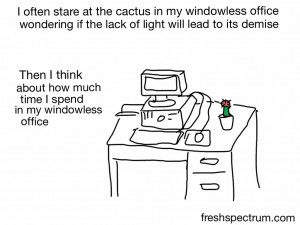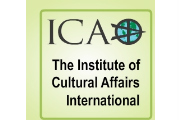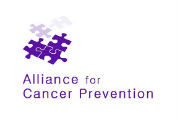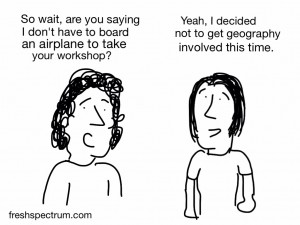Jan
Facilitation 2.0 and Virtual Workshops
Chris Lysy’s lovely cartoon used to encapsulate my excitement when I boarded yet another environmentally destructive flight in order to plan, learn, teach, facilitate and share ideas with like minded peers and clients all over the world. However, 2013 has been a wonderful year of desk based globe trotting. It’s been challenging, stimulating, educational, productive, and I also paid the bills and kept the wolf from the door. I managed to limit my work trips to just one intercontinental flight, and merely a couple of European flights – less than a 10th of my usual air miles and a record in almost 2 decades!
This is why:
Among the highlights of 2013 for OCR, virtual facilitation stands out as being particularly satisfying on a number of levels. Convening a group of participants who remain scattered across the globe for a workshop is beautifully carbon neutral, and it also permits deep participation of individuals who cannot/do not wish to travel, either because they have domestic commitments, too many other work priorities to warrant dedicating several days to an activity which might be important but which does not feel urgent, or ‘merely’ excruciatingly tight budgets. Virtual workshops create a quality of interaction which is sustainable between participants far beyond the workshop itself.
The Barefoot Guide Virtual Writeshop is described in a separate blog post. This involved eleven participants joining an online workshop, hosted via Adobe Connect, from locations as varied as Finland, South Africa, the UK, and the US. The group was convened and facilitated by Orla, and produced* by Martin Gilbraith. (See the very bottom of the post for more information on the ‘producer’s’ role. Martin, in the meantime, provides a very succinct description of what on earth a facilitator, virtual or otherwise, is actually for!)
The two other substantial events were the Institute of Cultural Affairs General Assembly, and the Alliance for Cancer Prevention workshop.
The ICAI General Assembly was held as a series of three virtual meetings, convening members of 19 of the affiliated national chapters of the Institute of Cultural Affairs. Participants reviewed and discussed national reports, voted on Board proposals, and deliberated on the ICAI strategy. Orla produced these meetings, which were convened and facilitated by Martin Gilbraith.
Alliance for Cancer Prevention workshop.
The Alliance for Cancer Prevention was similarly global, convening interested individuals from the US, Canada, Belgium and the UK to listen to and discuss the implications of a series of presentations from keynote speakers on environmental risks and hazards. The meeting was convened and facilitated by Helen Lynn and co-facilitated and produced by Orla.
Across these and other ‘virtual’ events, a huge variety of techniques were employed, including audio, video and PowerPoint/Pezi presentations, small breakout groups to brainstorm, polls to determine priorities for the discussion (or, indeed, for more formal reasons, such as voting on proposals from the board of ICAI), debriefing and responding to others’ feedback, documenting discussions, and planning next steps.
Feedback from participants in all of these events was extremely positive.
“It was a great meeting!!!!, Thanks for a very professional virtual facilitation job. Wow!!! It is incredible what technology is permitting in these days”
“Great meeting – unbelievably positive experience”, said a participant from the Ukraine (who had to keep herself ‘muted’ for some of the time due to the riots outside her window)
“Thank you very much for your superb job today. You did a wonderful job engaging members”
“Thanks to you all for a very satisfying learning and sharing process. Wow! These online meeting platforms really have great potential! I imagine a global community of practitioners linking like this each month – perhaps in the form of an action learning set…Or for like-minded individuals from diverse worlds (campaigners, government, activists, NGOs, community, CSR, donors, etc), reflecting on the real work, and building circles of support, and dreaming up brave social change initiatives!”
It was apparent that familiarity and practice with the software (Adobe Connect) enhanced participants’ experience. Being able to interact via text as well as audio both permits a fairer distribution of ‘airtime’ across individuals, but also permits ‘work-arounds’ for anyone who has technical challenges, such as malfunctioning headsets or poor bandwidth.
Other successful ‘virtual’ work in 2013 included completing, reviewing and validating a ‘theory of change’ for streetfootballworld (convened and facilitated by Orla, and produced by Esther Mae Cox). It also involved being member of the organising committee of the fast and furious Online Facilitation Unconference 2013, which was held in parallel with International Facilitation Week 2013, in which Orla hosted a workshop and participated in others, and also provided ongoing commentary via the OFU twitter feed.
To conclude this rather long summary, after the steep learning curve over the last couple of years learning how to ensure that the offer from virtual meetings and workshops at least equals and in some case surpasses ‘live’ events, we’re now really looking forward to further embedding this in the OCR offering in 2014. In addition to continuing facilitate and/or produce these events, we’ll also continue to offer training (Orla is an associate trainer on the 5Deep/ICAUSA “Technology of Participation Virtual Facilitation Online Training course”) and mentoring/supporting individuals and organisations who wish to become self sufficient in this area. We’re also these services in the form of production support to facilitators.
For a conversation about or demonstration of this approach, give me a call, and keep an eye out for demo videos which I will – eventually – upload!
In the meantime, here’s Chris Lysy again:
*For high profile, high ‘risk’ meetings (risk relating to the number of people attending, the vagaries of bandwidth, individual’s comfort with technology, and the complexity of the meetings themselves in terms of integrating audio, text and sometimes video, and managing and ‘floorwalking’ in breakout rooms, it is extremely important to have a dedicated facilitator and a dedicated producer. This liberates the facilitator and participants from having to interrupt the flow to address the ‘can you hear me’ issues, helps to address individual technical problems (e.g. ‘are you sure your headset isn’t muted’), helps to marshal people into breakout rooms (and retrieve them afterwards) and manage the documentation of the workshop so that the facilitator can focus on the dynamics of the group and the content being produced. The producer is also a fully trained virtual facilitator and is conversant with the detailed facilitation script for the workshop, so acts as an ‘insurance’ in case there are any technical problems at the facilitator’s end.
And a little light relief: here is the kind of virtual meeting we’re trying to avoid: a youtube video of one of the uncomfortable and frustrating kinds of meetings! http://tinyurl.com/l4fzbng




Leave a Reply